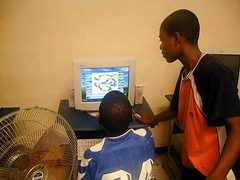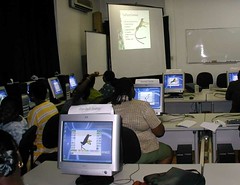OLPC and F/LOSS enthusiast Dr. Sameer Verma, an Associate Professor of Information Systems at San Francisco State University has been beating the XO drum in Jamaica with this presentation to the University of the West Indies/Mona (UWI) and at the ICT4DJamaica conference (with great photos) last September.
You probably already know Sameer from either his role as organizer of SF-OLPC or his OLPCNews guest entry earlier this year, What Keeps Me Going, discussing the promise of the OLPC and excitement he's seeing in pilot projects across the world, including Jamaica.
Jamaica now has its own grassroots OLPC group, OLPC Jamaica, and the beginnings of a pilot project in August Town, a community near UWI, less than a mile away from where I lived while in Jamaica. Low cost computing devices are not new in ICT4Development, and certainly not in Jamaica. In fact, in 2004 I was privileged to work with one such project using AlphaSmart.
The rugged keyboards/word processors extend the utility of a single computer to the entire classroom - students could write stories and do basic math, share these through the keyboard's IR interface, and sync with a central computer through the IR or a USB interface - many functions the OLPC makes much more powerful. It was this project that I used to work out one of the earliest realistic TCO numbers for an OLPC project.
Jamaica is a promising location for the OLPC XO to have a real impact -- it has a lot going for it already (and just as many challenges, to be sure). Jamaica is essentially an English-speaking country a short flight and within a timezone or two from most of the US, eliminating many challenges with translation and communication.
Jamaica has an active and highly skilled Linux Users Group, with Linux labs and open source advocates at the major universities and within many of the relevant Ministries. What Jamaica lacks in hardwired infrastructure, it makes up for with cellular networks (with GPRS data capacity) which work islandwide, and an infinitely innovative set of untrained electrical engineers.
I've seen firsthand Jamaican students taking to computers and especially graphic art and music software like fish to water. At the same time, I lost a webcam in Jamaica to a colony of ants, and humidity, power surges, and dust were constant foes in keeping computers up and running.
A Jamaican OLPC project will require everyone to be involved, not only the enthusiasts, but also local Jamaican Linux users, university students and staff, training organizations like HEART Trust NTA and of course the Ministry of Education who can convene and train the teachers.
As a Peace Corps volunteer, I worked with the Ministry of Education (primarily), schools, JaLUG, and many organizations across the island on a variety of ICT4D and ICT-for-education projects. I would be overjoyed to see the Sugar-based XO provide exciting educational opportunities to Jamaican students.
However, there are challenges with the still-high price of the XO, familiar implementation challenges in rural areas with little power and sparse telecommunications infrastructure, and costs associated with curricula development and teacher re-training.
Further, the XO must measure its success against the strict test-based requirements of the Caribbean education system, which is a debate by itself, but for now must be taken as a given and a required outcome of any project would be to improve specific test scores.




